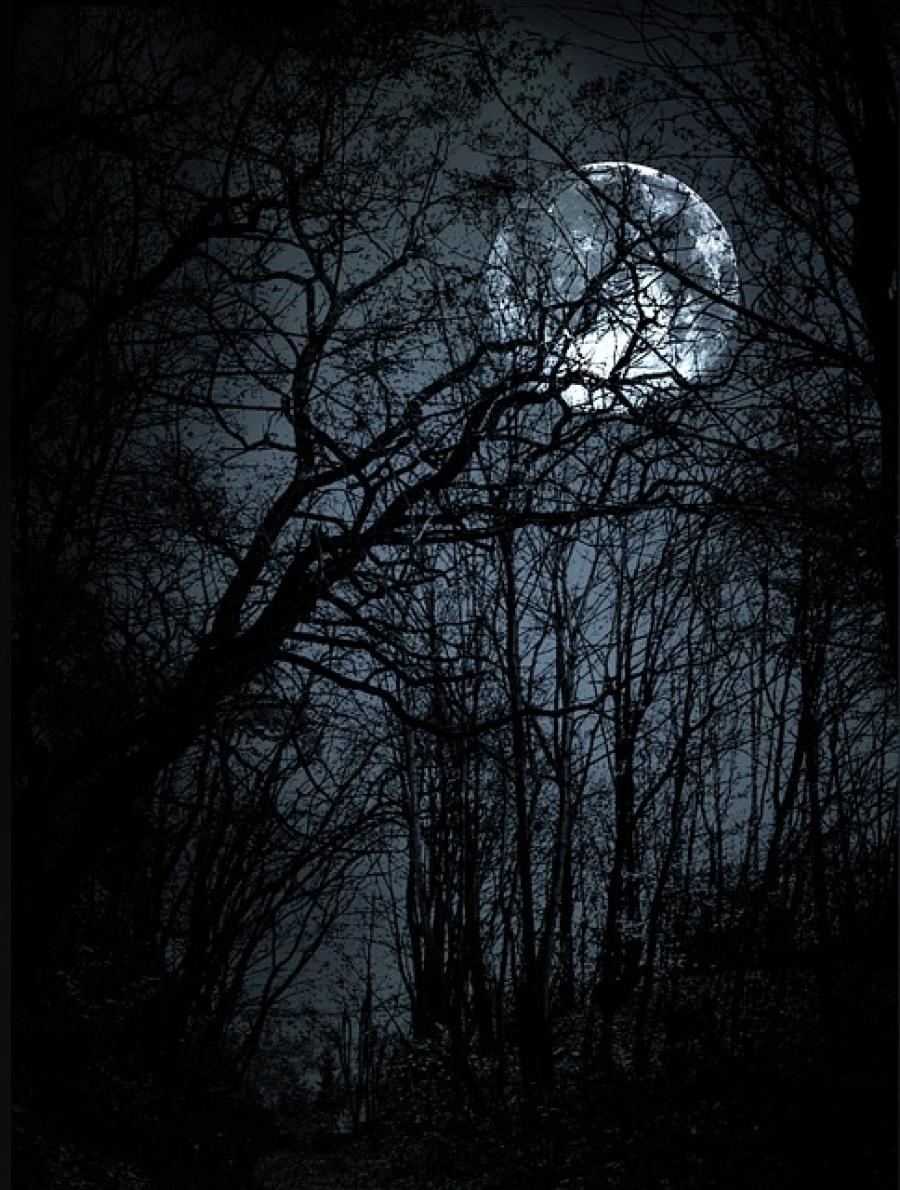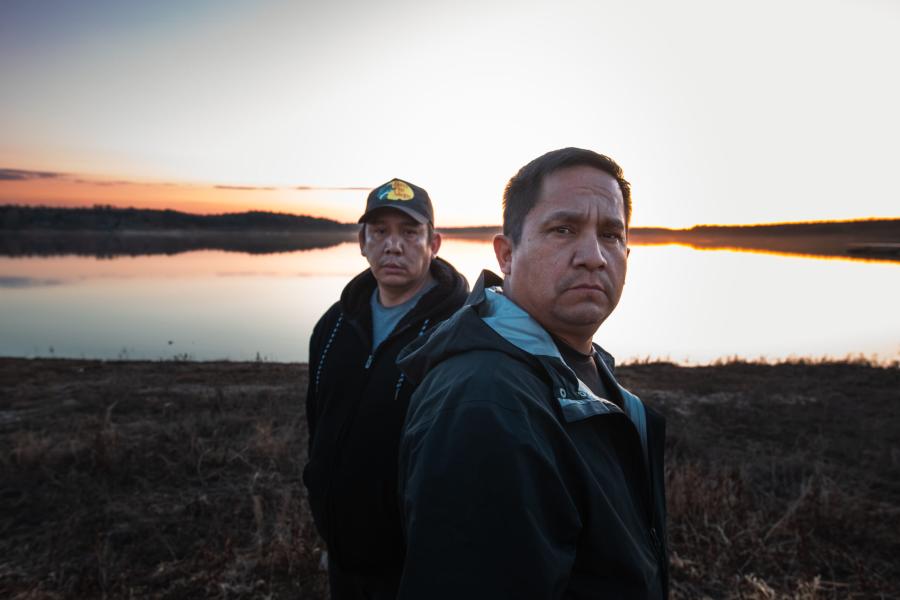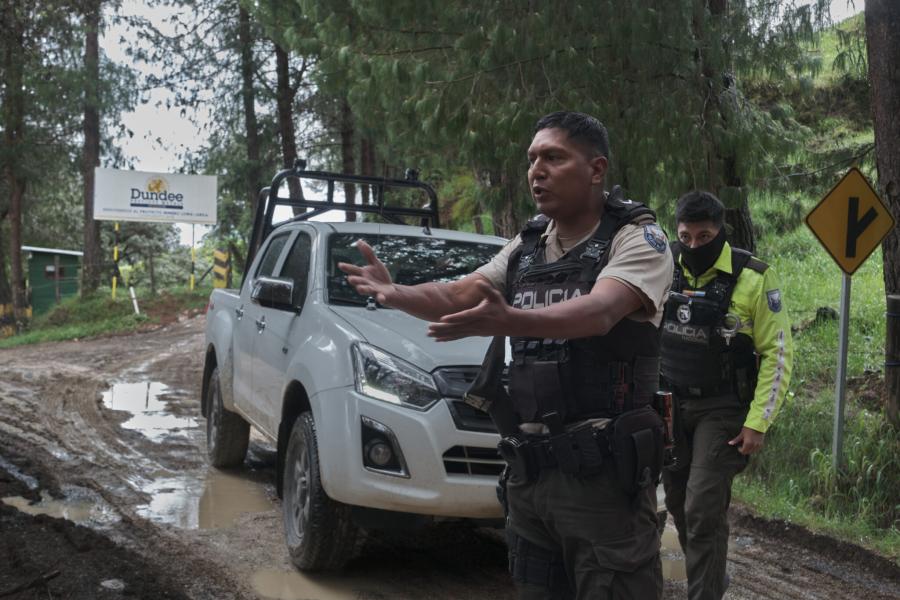In the eastern interior of Alaska, the Yukon River pushes out of Canada and arches above the Arctic Circle through a broad lowland called the Yukon Flats. This is the homeland of the Gwich'in Athabaskans who were among the last Native peoples of North America to have direct contact with Europeans when fur traders established Fort Yukon in 1847. Since then, there have been great changes in this remote comer of the north. But in remarkable ways, life on the Yukon Fiats continues as it has for centuries and hunting, fishing, and trapping remain cornerstones of the Gwich'in culture and identity.
In the morning sun, Fort Yukon resident Clarence Alexander paddles a canoe across the lazy waters of Sucker River and glides silently alongside his fishnet, smiling at the first silver flash of fish through the tea colored water. At 60 years of age, Clarence has risen, through competent, quiet leadership, to a position of influence among his people. He currently heads the Council of Athabaskan Tribal Governments, an entity he helped establish in 1988 to advocate for regional self-sufficiency and to explore ways of integrating customary and traditional values into the contemporary setting. He served as the traditional chief of Fort Yukon from 1980 to 1994 and presently chairs the Alaska delegation of Indigenous Survival International.
Back at his home in Fort Yukon, we cleaned our morning catch of fish and Clarence offered me his perspective on growing up on the Yukon Flats, the cultural importance of maintaining connections to the land, and on the ongoing subsistence debate in Alaska. What follows are excerpts from this discussion which took place on May 23, 1998.
A Transition
Q: You have seen big changes in your lifetime. Can you start by telling me about some of those changes?
Alexander: I was given the opportunity to grow up in Alexander Village outside Fort Yukon. Fort Yukon was still just a seasonal base until 1949. I know, because I was around here. My grandmother was there at the first contact with white people. She was a young girl when they first came around here; French Canadians; first contact; she was there. I remember she said they were making soap or something when they came by So anyway I asked her, "Grandma, when you first saw white man did you see anything good, and if you did, could you tell me what it was?" And she was thinking for real long time but she finally said yes, and the word she told me in our language means `ice plate,' years later I finally figured it out -- what impressed her most that she liked was the china plate (laughs). But it was my generation who saw the biggest change. The transition I guess you call it. I basically went from being a nomad to coping with the working world. The older generations gave us certain values-they say these values that we have are good-these are the values that will be acceptable, and they will not accept you with these other values because they are too extreme. They knew they had to change peoples' ways of thinking. This is what was changing. And of the 30 or so people of my generation I grew up with, only four are still alive today The others were unable to cope with the values that were placed on us and they did themselves in.
Defining Subsistence
Q: I want to talk about subsistence and you say this is a word you have a hard time with. Can you tell me why?
Alexander: As long as you keep using the word subsistence I have a mental block. If you say `subsisting,' the connotation of that word to me means that you are being a welfare recipient. It's interesting, you know it is a word we never ever heard growing up in school. I'd never seen it. But through my life somewhere along the line I heard about farmers in some part of the world being subsistence farmers. These farmers were being supplemented with tools or materials by the government in order to develop food for their livelihood. And I cannot figure out a way to fit that word into the world I come from. I don't think the word `subsistence' exists out here. I don't subsist. How can I? It is a word that was created to create animosity It has nothing to do with talking about a way of life if we are talking about supplementing or dividing up the little bit that is left over when the productivity of an area is not what it should be and resources are down. That is not what is going on here. There is no resource problem here. None. I was born into a heaven here! A heaven of its own! It's all there.
Q: If we agree that some of the things that separate the Gwich'in culture from other cultures are the connections they have to the land and resources around them, what word should we use to describe these connections if we don't use the term subsistence?
Alexander: This is what I was trying to think about when I heard you were coming. I was thinking in Gwich'in about how to tell you what I was born into. In my language, the closest thing I can come to what you are talking about is -- we would say T'ee teraa'in. It meanshow do I explain it-people working together and sharing to accomplish something `to accomplish common goals.' Working to catch fish, working to get birds, working to get rabbit or something, working together to prepare and cook these foods-T'ee teraa'in.
Caretakers of the Land
Q: How important to your culture are the connections to the land you talk about?
Alexander: You can't separate them. You destroy the connections and you destroy the culture. And we are being forced away from it by this other culture coming in that you keep talking about. The Gwich'in people don't want to get away from it. You cannot destroy the caribou. You destroy the caribou you destroy the Gwich'in people. My connections to the land are the animals' connection to the land. The animals are the ones that maintain themselves on this land. And how I maintain this land is the key to survival. The abundance has stopped since the people that are related with the land have not been allowed to be the caretakers of the land. The abundance of all species is slowly diminishing because the traditional caretakers have been forced to not bother. The new caretakers, the state, the federal agencies, they have their own agenda. Our resources came from the land because that makes us part of the land. It's a source of food that is created by that given area; that's what makes my life. Thirty thousand years of legends have been passed on orally as a teaching tool to maintain our existence on how we can live off this land. And how to maintain it is to make sure we do not disturb the resources.
When I am out here, my food comes from willow, from sedges, from the bottoms of the lakes, and all this vegetation that grows up here. Everything I did up to 20 years old was clean, clean living. Clean, meaning that I use fish from out there, birds from out there, animals from out there. And I know it was clean because I could see where it lives. I can eat it. That's my connection. We have covered this land inch by inch. Our connection is that we know every little bit of the land, where it produces and where it does not, and those areas that produce are always being protected. Always. Remove that and our society is not going to last.
Q: What problem do you think the state is trying to fix with this decades-long debate over subsistence?
Alexander: I'm telling you we got no problems up here. The biggest problem is with the rules and regulations. And we have few problems since we have been allowed to help make those rules and regulations-which has only been fairly recently -- I would say since the conception of the subsistence division [Alaska Department of Fish and Game, Division of Subsistence] people here have been more involved in the development of rules and regulations. They talk now about when is the best time for them to use certain resources -- when, and where, and how -- and that seems to be the working order for us. I never had any problem with it. So what has been going on for generations is now starting to work its way into the paper world, into law. We have to have laws. You can't just go out and shoot a moose any time you want. If everyone around here participates on the advisory committee and makes regulations that fit their livelihood and says this is it -- we can't function any other way. If we are to function otherwise, then I would say we really are subsisting. The problem is that we don't always have a say in the regulations because people making the laws have a racist attitude against local people.
A Vision for the Future
Q: So would you say that the solution to the subsistence debate is to have local people make local hunting and fishing regulations?
Alexander: It should be a more regional set-up than it is. People in Yukon Flats should set the regulations and seasons for their own area. I don't mean that nobody else couldn't come in there and hunt, maybe they need a permit or something so we issue them a permit. Non-local, Fairbanks, out-of-state, whatever, but we maintain the control. We can't just have an open door policy How would they like it in Fairbanks if we all took our boats up to Circle and drove into Fairbanks area to hunt moose? They wouldn't like it one bit, I tell you.
There is no reason why someone who lives in interior should be telling someone out on the coast what kind of regulations to have on their herring, their seal, their blackfish. All that should be done within that particular region according to how and when they use them.
Q: A few days from now the state legislature is meeting in special session to try and resolve the subsistence issue. How will the outcome of that session affect you here on the Flats?
Alexander: I don't think anything has ever been done in Juneau that is going to curtail a way of life. No way, shape, or form. What they do down there on the books is one thing. What has been going on here for generations is another.
Q: I'd like to end by looking into the future. Five hundred years from now, are you optimistic that there will be Gwich'in people here with these strong connections to the land, or is it being lost?
Alexander: I would say 500 years is not long enough. We will still be here using this land if we have some sort of control over our area. But if we give up that control, immediately it will be polluted, immediately there will be mining activity, immediately there will be seismic operations going on, agricultural experiments, large farming, cutting or burning of trees saying there will be more moose, immediately they will be utilizing our water that flows through here. The key is to maintain control over the direction the region is going. Generations change, some of our members have chosen not to participate in the lifestyle but maintain a mental awareness of the culture. But the connections to the land-base are not being lost. Everybody does it every day around here.
Right now some of our young people are; out there being instructed by their mentors. They are not losing it. Just yesterday we had big fat beaver that my neighbor cooked up. He said he cooked too much and would I like some? And I told him you are talking to the right person! My son sat down with me and we ate it all up. My youngest one here, you can't say he's losing it, because he likes what I do, but he also likes what's happening on the other side. So I tell him there is nothing wrong with living in two worlds. Absolutely nothing. You can come back here and switch a switch and do what you want here, but you need to maintain the principles that have been established-maintain those and keep those. Don't try to fix what has been established for thousands of years by our elders. I tell him if you try to change that perspective you'll have problems.
Selected Reading:
Caulifield, Richard A. 1983. Subsistence Land Use in Upper Yukon Porcupine Communities, Alaska. Juneau: Division of Subsistence, Alaska Department of Fish and Game. Technical Paper No. 16.
Sumida, Valerie A. 1989. Patterns of Fish and Wildlife Harvest and Use in Beaver, Alaska. Juneau: Division of Subsistence, Alaska Department of Fish and Game. Technical Paper No. 140.
Sumida, Valerie A. and David B. Anderson. 1990. Patterns of Fish and Wildlife Use for Subsistence in Fort Yukon, Alaska. Juneau: Division of Subsistence, Alaska Department of Fish and Game. Technical Paper No. 179.
Wolfe, Robert J. 1992. Trapping in Alaska Communities with Mixed Subsistence-Cash Economies. Juneau: Division of Subsistence, Alaska Department of Fish and Game. Technical Paper No. 217.
Article copyright Cultural Survival, Inc.



